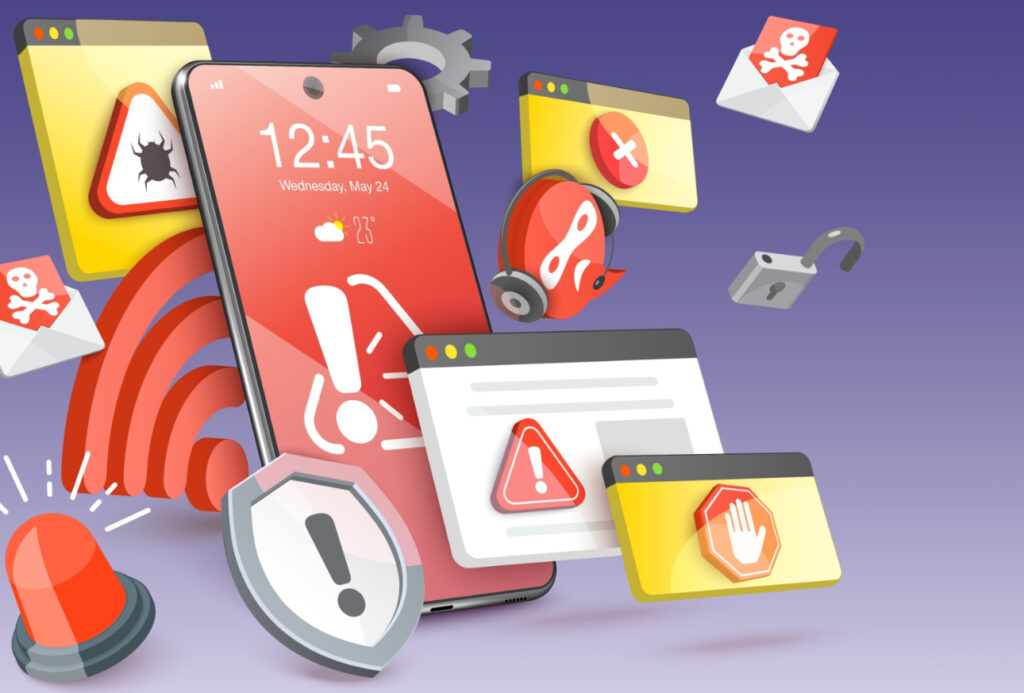There’s often a certain naivety with Apple device users when it comes to security. Many believe that their iPhones are invulnerable to hacking, sadly though, they’re very wrong. An iPhone, like any other device, can be hacked. So how can you tell, and more importantly, what can you do about it?
While there is that element of aforementioned naivety, it needs to be noted that hacking an iPhone isn’t an easy task to accomplish. The way in which the core of iOS is designed means that it’s difficult for a hacker to gain access to the system; it’s not impossible, just significantly more challenging than accessing an Android device.
Another element to consider when talking about iPhone hacking, is market share. Android enjoys roughly 85 to 90 percent of the total smartphone market, which of course means that hackers are going to target it over another mobile operating system. Apple takes up the remainder (with a small percentage being used by other mobile OS developers), so it’s less likely to have a focused and targeted hack directed at it.
“A thank you from us to you. We work very hard to produce the content for you on our site and we are all proud that our books, magazines and web content has been so useful to so many. Your support means so much to us and is very humbling. So as a small token of our thanks we are delighted to offer you this exclusive 25% money off discount code for you to use on your next purchase from our store. Simply enter NYHF23CN at the check out to receive this discount. This code is yours to do with as you wish so please feel free to share it online with your family and friends or on your social accounts. Thank you again and we will look forward to seeing you again on your next visit.
Kind regards from all of us on the PCL team.”
By way of the above, the virus and malware creators generally tend to develop for the most used system – in this case, Android. According to researchers, 97 percent of all viruses and malware are for Android devices, a little over 2 percent target other devices, and less than 1 percent are directed toward iOS. So Apple users can breathe a little easier in this respect.
One more feature that better protects iOS over other mobile platforms is Sandboxing. This means that all the apps developed for, and running on iOS are executed within their own unique walled-off space (the ‘sandbox’). If any of the apps should contain malicious code, Qthen the execution of that code will only be within the sandbox, and not affecting the core operating system. Android, on the other hand, while a great OS, is designed to be open and more flexible – which gives the users and developers a lot more flexibility, but at the detriment to the core security.
Am I Hacked?
However, as we mentioned earlier, there’s no un-hackable system (at least not one that the public has access to). iOS hacking does exist, and for those unfortunate to have been hacked it’s a terrible ordeal to go through. Thankfully, there are a number of signs you can look out for to determine whether your iPhone’s security may be compromised.
Power Cycle – If your iPhone has been hacked then there’s a good chance that the code being run, to achieve the hack and compromise the security, will be designed to stop the user from rebooting, or shutting down the device. Obviously, if the device goes through a power cycle, then the code won’t be able to get hold of the core system file and do its job, so malware generally tends to stop the user from being able to power off their device. Try turning your device off, if it refuses to power down, then this could be due to some malicious code being run in the background.
Battery Use – Another indicator to a possible iPhone hack is extraordinary battery use. Depending on the type of hack that’s being executed, your phone will be doing double the amount of work it usually does. If your battery is getting hot without you doing much with the phone, and if you notice the battery life being drained much quicker than usual, then there’s a possibility some nefarious code could be at work.
Tapping – Tapping an iPhone is a hack that enables someone to listen in, and record, the voice and video conversations on your device. Think of the phone taps we used to hear our favourite detective TV shows order on a suspect. Tapping can usually be detected through a series of clicks, static, and echoes when you’re using your phone. Sometimes it could just be a bad line, it happens, but if it’s a constant aspect to your phone, then you could be being tapped.
Suspect Activity – In general, your iPhone shouldn’t be doing much without your input. Should you ever witness it suddenly powering up when locked, rebooting or turning on without your input, or even installing apps by itself, then there’s a good chance that someone has used a hack to gain remote access to your phone.
Is It A Hack, Or Something Else?
While the above tend to lean toward malicious activity, there’s always a chance that they could be due to some other problem – although perhaps not the self-installing apps activity. It’s very easy to go down the I’m being hacked road when the problem could simply be an update that’s not being installed correctly, or a faulty iPhone. Don’t always jump to conclusions, but at the same time use caution.
What Can I Do?
You do suspect that your phone has been hacked, and it’s possible being used to steal your identity or some other criminal activity, then there are some options available to you:
Contact the Police – If someone appears to have stolen your identity or data, or is even blackmailing you over your data, then it’s classed as a criminal offence and the police can be contacted. From there, they will be able to advise and help you though the situation.
Contact Apple – A hacked iPhone will more than likely also mean a hacked Apple account. One of the first things you should do if you suspect your device is hacked is to call Apple Support. They will be able to detect activity, and shut down or suspend your account until the problem has been solved.
Contact Your Bank – If you store valuable banking data on your phone, or if you’ve used it in the past for online banking, then you’re recommended to contact your bank. The bank will be able to advise you, and monitor your accounts should something happen, as well as change your access credentials.
How to enhance your iPhone security
For the most part your Apple device is pretty secure, but there are steps you can take to further improve and enhance the device’s security to better thwart the ever-devious hacker.
Never Jailbreak – Jailbreaking is bypassing the built-in security of a device, enabling you to install third-party apps and even operating systems – extra points awarded to those who thought we were talking about the 1986 Konami arcade game, though. While fun, a jailbroken iPhone can be a huge security risk, so it’s really not worth it.
Updates – Constant updates can be a pain to download, install and activate, but they’re created for a reason. Updates add better features, improve the device’s performance, and more importantly, enhance the security. Outdated features and firmware are often the first call for malware, so keeping your device up to date will eliminate those security holes.
Nosey Apps – Always take the time to see what features on the device an app wants to use. Hardware such as the device’s mic can be used by the likes of the Facebook app, so if an app is wanting to access the device’s gallery, mic, camera and so on, and it doesn’t need to, then revoke an app’s permissions to hardware under the Privacy settings.
Passwords – Regardless of whether you use an iPhone or not, it’s crucial that you use good, and unique passwords on all your websites and online accounts. Don’t associate your password with anything personal, such as the name of your pet or date of birth, as these can easily be discovered. Instead use random passwords that aren’t attached to you. If it helps, use a password generator, and don’t forget to include numbers, upper and lower case letters, and special characters within your password.
VPNs – A VPN (Virtual Private Network) is a special connection to a service that greatly enhances your online security. A VPN works by encrypting the data being sent to and from your phone, to military grade levels. This means that any communications intercepted by a third party can’t be read. If you frequently use WiFi hotspots, then a VPN is a must-have app, as hotspots are notorious for hackers to infiltrate and steal data.
Multi-Factor Authentication – Where possible, use Two-Factor Authentication (2FA) within your apps and when logging into important websites. 2FA is designed to send you a text message containing a unique code which needs to be entered in order to gain access to the app or site. This greatly improves your security, as hackers will need to also have access to the text function as well as the app.
Auto-Delete Messages – Although considered a little extreme at times, enabling the auto-deletion of messages to the minimum of thirty days means that your messaging history will be permanently removed from the device. Should someone gain access to it, then their access to your personal data will be limited.
Security Apps – Installing a good antivirus/antimalware, security suite is certainly worth considering. There are many available, from the likes of McAfee, Avira and Norton, each offering their own unique features and enhancements to further improve the levels of protections on the device.
Avoid Links – One sure-fire way of getting malware into a system is through opening links. These links are often sent via messaging and emails, but can also be found from social media platforms, and the likes of WhatsApp and such. Tapping on a link will open a site where the malware payload will be sent to the device you’re using to view the link. While nothing may seem to happen to you, in the background the malware is busy accessing your device and personal data. Avoid links!
Find My – Apple’s Find My iPhone feature is one of the most handy elements available to the Apple user. Should you lose your device, then logging into Find My iPhone from another Apple device or the web interface, will display the device’s current location within metres. On top of that is the ability to remotely wipe the device, so even if someone gets hold of it your personal data will be removed.
Vigilance is key
There’s a lot you can do to prevent your iPhone from being hacked, but the main and key factor in the improvement of your device’s security is you. By training yourself to be more aware of the dangers that are out there, in terms of hacking, then you’ll be more prepared should something ever happen. You’ll also be more likely to avoid certain pitfalls, such as clicking and tapping on dodgy links, avoiding certain websites, and having good passwords for all your accounts.
You are the weakest link in any security setup, so start by enhancing yourself.
You may also like Apple Products


